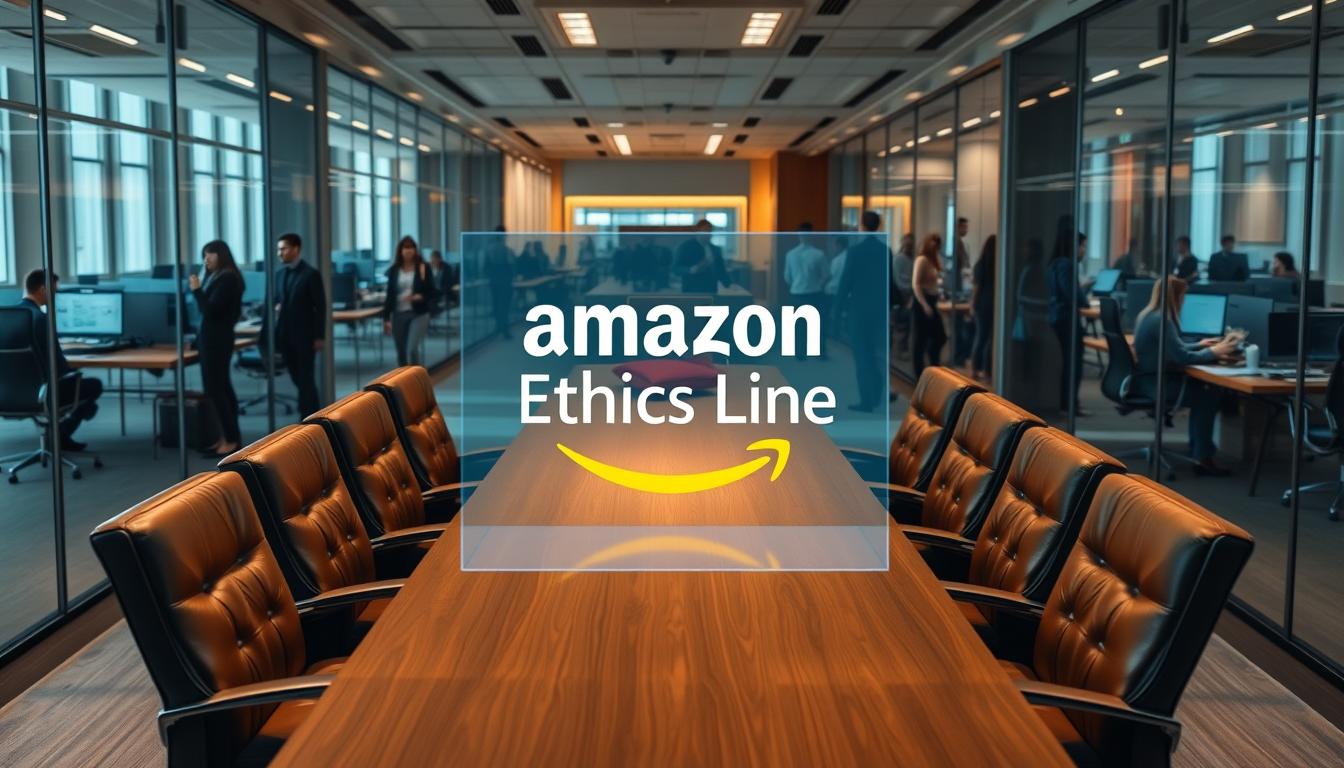Navigating Amazon’s Ethical Commitments: The “amazon ethics line” Explained

In today’s global business environment, maintaining ethical standards is crucial for any organization. One key tool that has emerged to support this effort is the ethics hotline. These systems allow employees to report concerns anonymously, ensuring that potential issues are addressed promptly.
Since the 1990s, ethics hotlines have become a cornerstone of corporate compliance programs. They provide a safe way for employees to voice concerns about misconduct, such as fraud, harassment, or unethical behavior. This process helps companies mitigate risks and uphold their reputation.
Transparency and trust are essential in fostering a positive work environment. By offering a dedicated reporting system, organizations demonstrate their commitment to ethical practices. This not only safeguards the company but also empowers employees to take action when they encounter concerns.
As businesses continue to evolve, the importance of these systems remains clear. They play a vital role in shaping a culture of accountability and inclusion. In the following sections, we’ll explore how these programs are structured and their impact on modern workplaces.
Key Takeaways
- Ethics hotlines are essential for maintaining corporate compliance and transparency.
- These systems allow employees to report concerns anonymously, reducing risks for the organization.
- Since the 1990s, ethics hotlines have become a standard part of corporate compliance programs.
- They address issues like fraud, harassment, and unethical behavior effectively.
- Transparent reporting systems build trust and foster a positive work environment.
Understanding Corporate Ethics and Reporting Systems
The introduction of ethics hotlines marked a turning point in how businesses handle internal concerns. These systems emerged as a response to regulatory requirements and the growing need for transparent corporate reporting. Over time, they have become essential tools for fostering accountability and integrity within organizations.
The Rise of Ethics Hotlines in Business
Corporate ethics programs have evolved significantly since their inception. In the 1990s, the rise of ethics hotlines was driven by the need to address misconduct such as fraud, harassment, and unethical behavior. These systems provided a safe and anonymous way for employees to report concerns, reducing risks for the company.
Today, ethics hotlines are a standard part of compliance programs across various industries. They ensure that organizations can identify and address issues promptly, maintaining trust and credibility. As one expert noted,
“Ethics hotlines are not just a compliance tool; they are a reflection of a company’s commitment to doing the right thing.”
How Reporting Mechanisms Enhance Transparency
Reporting mechanisms play a crucial role in enhancing organizational transparency. When an employee contacts a hotline, they typically go through a structured process:
- Initial Report: The employee provides details about the concern anonymously.
- Adaptive Interview: A trained professional asks follow-up questions to gather more information.
- Investigation: The company reviews the report and takes appropriate action.
- Follow-Up: The employee is informed about the outcome, ensuring accountability.
This process not only addresses immediate concerns but also builds trust within the team. By integrating robust reporting systems into their compliance programs, companies can create a culture of inclusion and accountability. Transparency in reporting ensures that employees feel valued and heard, fostering a positive work environment.
Exploring the “amazon ethics line” in Corporate Compliance
Corporate compliance programs have become a cornerstone of modern business practices. These programs ensure that organizations adhere to legal and ethical standards, fostering trust and accountability. One key component of these frameworks is the ethics hotline, a tool designed to empower employees to report concerns safely and confidentially.

Definition and Purpose of the Amazon Ethics Line
The ethics hotline serves as a dedicated channel for employees to voice concerns about misconduct or unethical behavior. Its primary purpose is to provide a safe, anonymous way for individuals to report issues without fear of retaliation. This system is integral to maintaining compliance and mitigating risks within the organization.
By offering a confidential reporting mechanism, companies can address concerns promptly and effectively. This not only protects the organization but also strengthens its ethical climate. As one expert noted,
“A robust reporting system is a reflection of a company’s commitment to integrity and transparency.”
How It Empowers Employees to Report Concerns
Employees play a critical role in upholding ethical standards within their organizations. The ethics hotline empowers them by providing a clear and accessible way to report concerns. This process typically involves:
- Anonymous Reporting: Employees can submit reports without revealing their identity, ensuring protection.
- Structured Follow-Up: Trained professionals review the report and initiate an investigation.
- Documented Outcomes: Employees are informed about the resolution, fostering trust and accountability.
This approach not only addresses immediate issues but also encourages a culture of openness and inclusion. Employees feel valued and supported, knowing their concerns are taken seriously.
| Industry | Hotline Features | Impact on Compliance |
|---|---|---|
| Retail | 24/7 availability, multilingual support | Improved risk management |
| Technology | Anonymous reporting, mobile app integration | Enhanced transparency |
| Healthcare | Confidentiality, dedicated case managers | Strengthened ethical climate |
In conclusion, the ethics hotline is a vital tool for fostering compliance and empowering employees. By providing a safe and confidential reporting system, organizations can address concerns effectively and maintain a positive work environment.
The Evolution of Ethical Commitments and Corporate Responsibility
Over the decades, corporate responsibility has evolved from basic misconduct reporting to sophisticated global compliance systems. This transformation reflects the growing need for organizations to address ethical concerns proactively and transparently.

Historical Development of Ethical Reporting in Organizations
In the early days, ethical reporting was often informal and reactive. Employees relied on direct communication with supervisors to voice concerns. However, as businesses expanded, this approach proved insufficient.
By the 1990s, structured reporting systems emerged. These systems provided a formalized way for employees to report issues anonymously. This shift marked a turning point in how organizations handled internal concerns.
Today, modern reporting systems integrate advanced features like multilingual support and mobile accessibility. These innovations ensure that employees worldwide can report concerns effectively.
The Role of Ethics Hotlines in Mitigating Corporate Risk
Ethics hotlines play a critical role in identifying and addressing risks within organizations. They provide a confidential channel for employees to report concerns without fear of retaliation.
This process helps companies detect issues early, reducing potential damage. As one expert noted,
“A robust reporting system is essential for proactive risk management.”
By addressing concerns promptly, organizations can maintain compliance and protect their reputation. This approach fosters trust and accountability within the team.
Integration of Global Best Practices
Modern reporting systems incorporate global best practices to ensure effectiveness. These practices include:
- Confidentiality: Ensuring that reports remain anonymous to protect employees.
- Accessibility: Providing 24/7 support and multilingual options for global teams.
- Transparency: Keeping employees informed about the resolution of their reports.
These features create a culture of openness and inclusion. Employees feel empowered to report concerns, knowing their voices will be heard.
As organizations continue to evolve, the integration of these practices will remain essential. They ensure that ethical commitments are upheld across all levels of the business.
Implementing and Managing an Effective Ethics Reporting System
Effective ethics reporting systems are vital for maintaining trust and compliance in any organization. These systems ensure that concerns are addressed promptly, fostering a culture of accountability and transparency. To achieve this, companies must focus on streamlining processes, providing training, and continuously improving their programs.
Streamlining Communication and Reporting Processes
Streamlined communication is essential for an efficient ethics reporting system. Employees should have clear, accessible channels to submit reports. This includes user-friendly platforms, such as mobile apps or web portals, that simplify the process.
Once a report is submitted, it’s crucial to ensure timely follow-up. Assigning dedicated case managers can help maintain accountability. As one expert noted,
“A well-structured reporting process not only resolves issues faster but also builds employee confidence in the system.”
Training, Inclusion, and Continuous Improvement
Training plays a key role in empowering employees to use the reporting system effectively. Inclusive training programs should educate the team on ethical policies and the importance of reporting concerns. This fosters a culture where everyone feels responsible for upholding standards.
Continuous improvement is equally important. Regular feedback loops and management reviews help identify areas for enhancement. By integrating modern technology and best practices, organizations can ensure their reporting systems remain effective and relevant.
In conclusion, a well-managed ethics reporting system strengthens compliance and builds trust within the organization. By focusing on streamlined processes, inclusive training, and ongoing improvement, companies can create a positive and ethical work environment.
Conclusion
Transparent reporting mechanisms are key to fostering a culture of integrity in organizations. Over time, hotlines have evolved into essential tools for addressing concerns and enhancing accountability. These systems empower employees to report issues safely, strengthening compliance and reducing risk.
Effective management of reporting systems ensures that concerns are addressed promptly. Continuous training and process improvement are vital to adapt to emerging challenges. By integrating global best practices, companies can build trust within their team and uphold ethical standards.
Organizations must evaluate and update their reporting programs regularly. A robust system not only resolves issues but also reinforces the company’s commitment to integrity. Investing in these mechanisms is a step toward a more transparent and accountable business environment.



